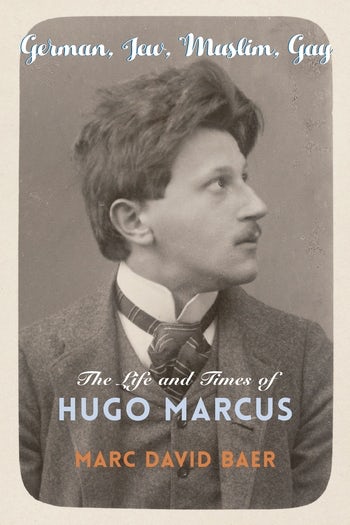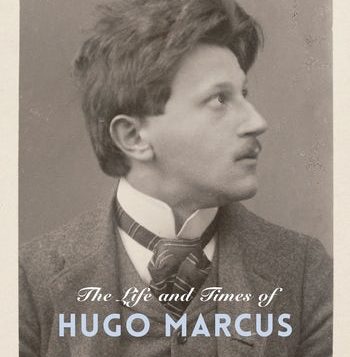 GERMAN, JEW, MUSLIM, GAY
GERMAN, JEW, MUSLIM, GAY
The Life and Times of Hugo Marcus
by Marc David Baer
Columbia University Press. 320 pages, $30
A WELL-RESEARCHED BIOGRAPHY by Marc David Baer, German, Jew, Muslim, Gay, tells the story of a remarkable yet little-known figure, Hugo Marcus. Born into a Jewish family in Posen, Germany (now in Poland), Marcus became an early activist in the homosexual rights movement. He later converted to Islam, taking the name Hamid, and wrote extensively for the German Muslim community. After the Nazis seized power and the name on his passport was changed to “Israel,” he fled to Switzerland, where he continued writing—including gay fiction under the penname Hans Alienus—as he did until his death in 1966. Baer explores Marcus’ diverse writings, including such essays as “Nietzsche and Islam” and “Law and Æsthetics” and the moving short story “A Pair of Shoes,” while providing background on the historical figures with whom he was connected. Baer’s book reveals the richly diverse, intellectually curious Germany that thrived before the Nazis ruined everything.
Born in 1880, Marcus went to Berlin for his education. While studying philosophy, he found and befriended mentors like sexuality researcher Magnus Hirschfeld, who worked to prove that homosexuality was “natural,” and to overturn Paragraph 175 of the German legal code, which outlawed homosexuality. Marcus worked at Hirschfeld’s Institute for Sexology on its monograph series, and he served as an expert witness in a trial against the first newspaper for gay people to be sold openly at kiosks. He fell under the sway of charismatic poet Stefan George, who, while never fully explicit about his sexuality, produced works with explicit homoerotic scenes. He also declared that he wanted to restore Germany to a “Hellenic model.”
One of Marcus’ professors was sociologist Georg Simmel, dubbed the “philosopher of the avant-garde,” who was active in left-wing politics and in the pacifist, feminist, and gay rights movements. Inspired by Nietzsche, Simmel saw capitalism as a “slave morality” and criticized Christian morality and economic inequality while “promoting sexual equality and … cultural elitism.” Marcus based his fight for gay rights on science, literature, and philosophy. He also had a personal stake in this struggle, as he was in a nearly lifelong relationship with Roman Malicki, “a younger Catholic man.” Nietzsche was a philosophical and personal touchstone for the gay rights movement in Germany at this time. In his manifesto Sappho and Socrates, Hirschfeld quotes Nietzsche’s dictum that “that which is natural cannot be immoral.” Baer also mentions the speculation among activists that Nietzsche was gay.
Marcus also took many of his views on homosexuality and Islam from the writings of Goethe, whom he saw as a “pole star.” Homoeroticism appears in many of Goethe’s works, as Marcus notes in his essay “Goethe and Love of Friends.” He also produced works about Islam with titles like “Muhammad’s Song” and “Muhammad Tragedy,” writing in the West Eastern Divan that he “does not even reject the supposition that he may be a Muslim.” Indeed, many German converts to Islam, including Marcus, considered Goethe a “secret Muslim,” even though Baer points out that Goethe also objected to some attitudes in Islam, including its prohibition on wine and its ambivalent feelings toward poetry.
Marcus’ fascination with Islam started at an early age, after “studying an old translation of the Qur’an in my hometown”—the same translation that Goethe had used. He viewed Islam through a German philosophical lens, at times misreading Goethe’s more mystical approach to advance his belief, described in pieces such as “Islam and European Philosophy,” that Islam was logical and would bring world peace. Even after converting, he remained with Berlin’s Jewish community until Nazi persecution forced him to cut all ties. It does not seem that Marcus’ sexuality caused any difficulties with the Muslim community.
German, Jew, Muslim, Gay, which goes easy on academic jargon but contains extensive notes and a lengthy bibliography, offers a full look at a writer and thinker who successfully lived in and moved among different worlds. It should bring attention to a long-neglected figure and his writings.
____________________________________________________






